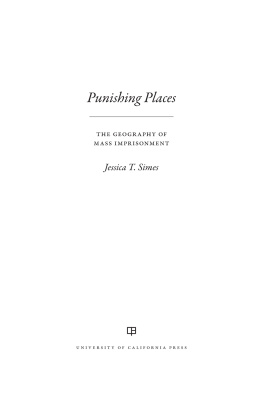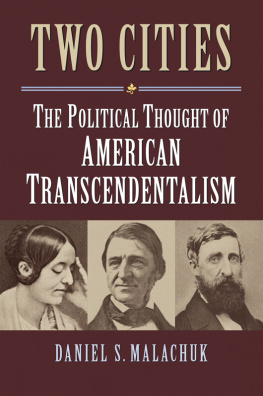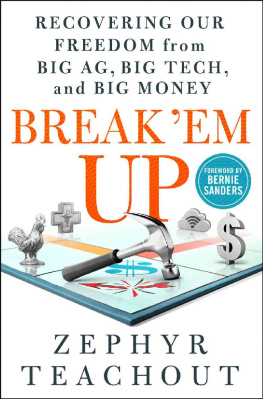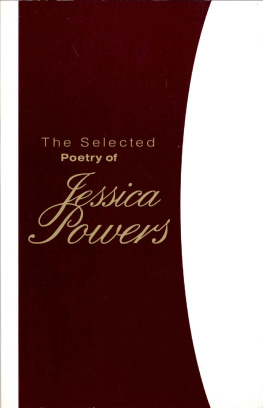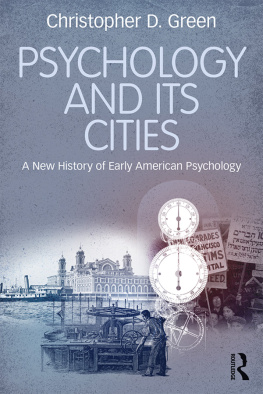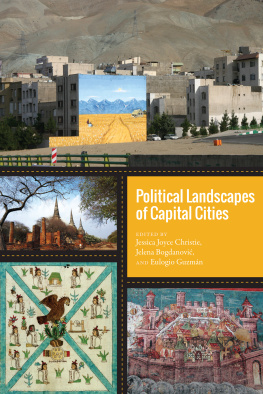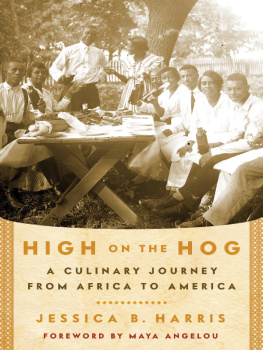JESSICA TROUNSTINE is assistant professor of politics and public affairs at Princeton University.
The University of Chicago Press, Chicago 60637
The University of Chicago Press, Ltd., London
2008 by The University of Chicago
All rights reserved. Published 2008
Printed in the United States of America
17 16 15 14 13 12 11 10 09 08 1 2 3 4 5
Library of Congress Cataloging-in-Publication Data
Trounstine, Jessica.
Political monopolies in American cities : the rise and fall of bosses and reformers / Jessica Trounstine.
p. cm.
Includes bibliographical references and index.
ISBN-13: 978-0-226-81281-6 (cloth : alk. paper)
ISBN-13: 978-0-226-81282-3 (pbk. : alk. paper)
ISBN-10: 0-226-81281-2 (cloth : alk. paper)
ISBN-10: 0-226-81282-0 (pbk. : alk. paper)
ISBN-13: 978-0-226-81283-0 (e-book)
1. Incumbency (Public officers)United States. 2. Local electionsUnited States. 3. Municipal governmentUnited States. 4. Power (Social sciences)United States. 5. Political cultureUnited States. 6. Patronage, PoliticalUnited States. 7. Political corruptionUnited States. I. Title.
JS395 .T76 2008
320.8'50973dc22
2008007421

The paper used in this publication meets the minimum requirements of the American National Standard for Information SciencesPermanence of Paper for Printed Library Materials, ANSI Z39.48-1992.
ACKNOWLEDGMENTS
AN ENORMOUS DEBT of gratitude is owed to a great many individuals who have offered me their time, knowledge, and support as I tackled this project. My advisor, mentor, and dear friend Amy Bridges first kindled my interest in urban politics, gracefully guided me though graduate school, and then walked me through the writing of my first book. Without hesitation she shared with me her data, her brilliance, and her excitement for academia. She provided unyielding support. There are no adequate words to thank her.
In addition to my advisor, I was lucky to be surrounded by wise and supportive faculty and peers in my graduate program. Zoltan Hajnal taught me to tie city politics to larger questions of democracy and how to quantify my arguments. He kept his door open to me on a daily basis for advice and coauthorship, and has continued to do so even now that our doors are across the country. Elisabeth Gerber guided my research designs, clarified my theories, and has unflaggingly introduced me to networks of social scientists. Steve Erie and Bruce Cain offered invaluable comments and generous enthusiasm. I also received helpful feedback from Gary Cox, Kathleen Cunningham, Gary Jacobson, Mike Kelly, Thad Kousser, Sam Popkin, Chris Shortell, Tony Smith, Melody Valdini, and the participants at the Consortium for Qualitative Research Methods second annual institute.
After leaving UC San Diego, I was lucky to find an equally important academic support system at Princeton University. David Lewis has allowed me to bother him frequently. He read many of the chapters in the book and offered terrific advice. Chuck Cameron read an early draft of the book and laid out for me a detailed set of recommendations for making it more persuasive and rigorous. I am grateful for his data-collection suggestions in particular. I also received extremely helpful feedback on research design, data analysis, drafts of chapters, and the publishing process from Chris Achen, Doug Arnold, Larry Bartels, Brandice Canes-Wrone, Matt Cleary, Josh Clinton, Martin Gilens, Fred Greenstein, Kosuke Imai, Karen Jusko, Jason Lyall, Nolan McCarty, Adam Meirowitz, Tali Mendelberg, Tasha Philpot, Markus Prior, Julie Taylor, Josh Tucker, Rick Valelly, and Robert Willig.
In the spring of 2006 the Princeton Department of Politics and the Center for the Study of Democratic Politics funded a manuscript conference so that I might be given formal feedback on the draft of the book. The comments I received from the conference participants were transformative. Amy Bridges, Douglas Massey, David Mayhew, John Mollenkopf, Rebecca Morton, and Paul Peterson dissected the manuscript. The amount of time these scholars invested and the degree of detail they offered for my revisions improved my project immensely. The two reviewers selected by the University of Chicago Press to review the manuscript offered similarly invaluable recommendations. John Tryneski has been an amazing editor. From the beginning he has been enthusiastic, patient, approachable, and incredibly insightful. I have trusted him completely. Rodney Powell provided extremely helpful advice as well.
Countless city and county registrars and bureaucrats aided my quest for data. Those in the San Jose city clerks office, the Santa Clara county registrar, and the San Jose Department of Public Works were especially helpful. Robert Lineberry mailed me a precious data collection for Chicago. Richard Simpson shared his vast knowledge of Chicagos city council and political underbelly. Kristen Badal, Zach Epstein, and Shivani Gupta provided excellent research assistance. I am grateful for the openness and honesty of all my interviewees who collectively spent many hours helping me understand the structure of power in San Jose.
This book is dedicated to my parents Mary, Celine, Phil, and Debbie, because they are without a doubt the reason it exists. They offered me profound love, critiques of my writing, and incredible insight into urban politics. I am also lucky to count my siblings among my very best friends in the world. David, Amy, Ryan, and Patrick, and my almost-sister Gemma have been my oldest and most trusted confidants. My newest family member, Brian, has kept me focused and calm, made me laugh until I could no longer breathe, endured countless conversations about political monopolies, and adored me. To you all, I offer my most heartfelt thanks.
INTRODUCTION
IN MANY WAYS, Chicago, Illinois, and San Jose, California, are extremely different places. Politically they represent the stark distinctions between machine and reform governments examined by generations of urban scholars. Throughout the twentieth century, Chicago pulsed with life. Sordid links among a series of infamous political bosses and notorious crime lords ensured that the city never went dry, reelection came easy, and men like Al Capone became fabulously rich. Chicago housed millions of immigrants in an economy of factories and slaughterhouses. The very model of a political machine, Chicagos hierarchically organized political parties were characterized by corruption, patronage armies, and decades of single-party rule established by bosses and maintained by working-class constituencies.
Meanwhile, on the other edge of the nation, San Jose made its way into the world as a sleepy, agricultural community with a single square block downtown. Its most famous residents have been innovators of technology, not politicians or gangsters. In recent years San Jose has consistently been ranked among the safest and wealthiest big cities in America. Typically, reform governments, like San Joses, have been defined only by their ideals and institutional structures: serving the good of the whole through efficient administration, dispassionate and removed from the gritty details of politics. Upper-class, middle-class, and business constituencies have been the strongest supporters of reformed systems. In this way, bosses and reformers have been placed in opposition to each other as representations of wholly different political worlds.

 The paper used in this publication meets the minimum requirements of the American National Standard for Information SciencesPermanence of Paper for Printed Library Materials, ANSI Z39.48-1992.
The paper used in this publication meets the minimum requirements of the American National Standard for Information SciencesPermanence of Paper for Printed Library Materials, ANSI Z39.48-1992.


